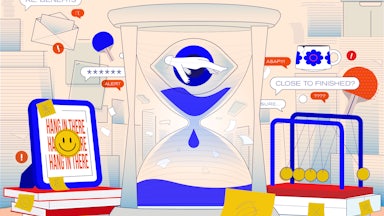When I was young, my dream job was to be a horse. I didn’t want to be a horse girl, but a girl who is a horse. This made sense to me back then and also now. People respect horses, whose reputation is unimpeachable. Their work often consists of clear, concise tasks, like pulling a plow from one end of a field to another or carrying a child in circles around a fenced-in ring. Their basic needs are also generally met: At the end of the day, they get fed hay and their little iron shoes get cleaned out and they sleep in a house with high ceilings.
My dream did not materialize, but as I entered the workforce, my early sense of what a dream job actually was only deepened. I wanted to do something I cared about and have my life taken care of in the process, but I always had some understanding that even the most fulfilling, best-paid job in the world would also still be work. After all, no one sees a horse pulling a cart and thinks that they aren’t laboring. Horses aren’t doing laps with fidgety nine-year-olds in their off-hours. No one says to a horse, “If you love what you do, you never work a day in your life.”
Some of this is only becoming more obvious, including to myself, in an era when stable, full-time employment is evaporating, and holding on to any job is its own kind of feat. The Economic Policy Institute calculates that the failed political response to the pandemic has left nearly 16 percent of the workforce—26.8 million people—unemployed or employed but losing hours and pay. And having work isn’t necessarily a guarantee against hardship—even before the current recession, one in nine workers received wages too low to get out of poverty, even if they worked full-time hours. But the idea of a dream job is still catnip. There’s a slew of self-help articles advertising tips on how to Land Your Dream Job by the End of the Year or 9 Genuine Steps to Quit Your Job and Fulfill Your Dream. Indeed.com lists info for 25 dream jobs, three-quarters of which have an average national salary of less than $50,000 per year.
A Mattress Firm internship, in which “Snoozeterns” are “encouraged” to sleep during work, making it literally a dream job, received more than 2,000 applicants. (One Snoozetern told me that she didn’t actually end up sleeping on the job, but she found the internship program fulfilling nonetheless.) There are Reddit threads for commonly romanticized jobs—park ranger, zookeeper, pilot—where posters ask detailed questions about how to actually make a career in one of these fields (“I love animals, but also have no training or special training with larger animals than a cat and dog. Is there anything I can do to work [at] a zoo with larger animals?”).
Some dream job listings go viral, like the one from San Francisco’s East Brother Light Station, which advertised an opening for a couple to live and work in a historic lighthouse-turned-inn for $130,000 (total) per year. With people imagining an idyllic life out on the ocean—crucially, the lighthouse has no Wi-Fi—the East Brother Light Station ended up fielding thousands of applications, only 60 of them coming from actually qualified couples, since the job requires a valid U.S. Coast Guard license. But when, almost a year later, The San Francisco Chronicle interviewed Tiffany Danse and Tyler Waterson, the lucky people who landed the position, the dream seemed much more like, well, a job. “We are the reception desk. We run the gift shop. We make the beds. We cook the meals. Tyler is your captain and local history guide,” Danse said. The couple told the Chronicle that they worked 80-to-90-hour weeks.
It’s not hard to see why these kinds of jobs are so enticing. The concept of the dream job still persists, likely because so many of us are working in what the late David Graeber called “bullshit jobs,” or are simply not employed at all. Finding your dream job is a seductive idea: the do-gooder, Protestant version of the FIRE movement—rather than trying to escape work, why not try loving it instead?
It’s a relatable impulse, but I imagine most dream jobs are more like running a lighthouse bed-and-breakfast for 40 paying guests than a paid vacation. Andrew Smith, who has worked as an interpretive ranger at Glacier National Park for four summers, told me that he loves his job, which mostly involves mediating between park visitors and the park itself. There are clear perks to being a park ranger—getting to know a natural site day in and day out is a kind of intimate experience that tourists don’t get to experience. Smith lives in park housing and is happy that he spends his days mainly outdoors, the dream of many metro-locked middle-managers, even if much of it involves dealing with frustrated tourists who can’t find parking at a popular trailhead.
But Smith told me that he still sees his job very much as work, with all the precarity that often comes with it. “Doing what you love as work is not the same as doing it as a hobby,” Smith said. “Going on a hike in uniform is just a fundamentally different experience than going out on my day off and enjoying the park that way.” Because Smith, like most national park employees, is a seasonal worker (right now he’s not employed by the park), his employment and benefits, while good during the park season, are unstable. Smith told me that some people leave park service when they turn 26 and can no longer stay on their parents’ health insurance. In the off-season, Smith works as a substitute teacher. Unless he lands a rare permanent park job, he can’t see it as a long-term career.
Caroline Lange, a cookbook recipe tester, feels similarly lucky that she loves what she does. “My friend says it’s like a rom-com job, which I think is really accurate,” Lange said. “You don’t even realize it exists until you meet someone who does it.” But testing recipes isn’t quite like living in a Nancy Meyers film—Lange said that the majority of her job isn’t actually cooking, but schlepping groceries. It’s more physically demanding than people realize (she’s on her feet for much of the day), and since the gigs are freelance, Lange has no paid sick days and is insured on the most basic state exchange plan, which comes with an enormous deductible.
What if your job was to explore the ocean for a living? Hillary Krumbholz is a research diver for a university in California, which means that every summer, she gets to go out on a boat and spend her days diving off the coasts of Monterey Bay, Carmel, and Big Sur, and into underwater kelp forests. The days when the dive is good, at remote sites no one can access, Krumbholz says that she remembers exactly why she loves her work; she tells me that she is definitely doing her dream job.
But much of that job, she also notes, is cleaning up—cleaning up personal gear, cleaning up the sampling gear, cleaning up the group gear. When I asked what might surprise people to hear about her work, she thought for a second and then said that she’s constantly cold. “We bring five-gallon hot water buckets with us, and during our surface intervals, we’re just dipping our hands inside of this hot water trying to warm up,” Krumbholz said. And like other dream jobs I learned about, it’s not enough to survive on: During off-seasons, Krumbholz also works as a substitute teacher and an aquarium dolphin tank cleaner; since being on university health insurance would mean she’d constantly lose it during the off-season, Krumbholz decided to stay on the state exchange instead.
There are certainly dream jobs that are more secure—the concept is a slippery one; for some herbs, being a high-paid corporate lawyer is the dream. But many so-called dream jobs look a lot like most jobs in America: unstable, tenuous, and part of a patchwork of gigs.
That these jobs involve a good amount of grunt work is no big surprise; nor does it take away from the satisfaction of doing something you love. But the widespread notion of finding meaning in work is a fairly new one, as Jill Lepore recently pointed out in The New Yorker. Unsurprisingly, it’s an invention of bosses—the idea that work isn’t supposed to suck changed in the 1970s, experts told Lepore, when “managers began informing workers that they should expect to discover life’s purpose in work.”
With people who are lucky enough to still have a job now working longer hours than before the pandemic, it’s not hard to see the susceptibility to this kind of messaging—when workers have so little agency about the conditions of their daily life, why not focus on the things that seem to be in their control? Doing what you “love” can sometimes blunt the impact of doing that work for long hours and for little pay. Still, the intended audience for this messaging about passion and purpose is deeply stratified by class—it is largely targeted to white-collar workers in nonprofit, tech, media, and other industries with job titles like Chief Fun Officer.
But the message around loving what you do can be warped to circumstance: People who work in low-income industries like care work, fields dominated by women of color and immigrant workers, are often exploited in part because they are supposed to love what they do. The language of “family,” often weakly invoked in startup culture, is literalized in fields like home health care, where the work is life-giving and incredibly intimate. This can be the frame—duty, family—through which poor wages and other workplace abuses are ignored.
This isn’t to say that loving what you do is bad—we all want to find meaning where we can in our lives, and many of these dream jobs involve caring for others and the natural world—but the romanticization of certain types of work can obscure the simple fact that they are jobs and, like any job, require mass organizing to suck less. A common mantra among park rangers is, “You get paid in sunrises and sunsets.” The implication is that if you’re working your dream, you’ll take any conditions that come with it. Smith told me that he hates that saying. “The sunrises and sunsets are beautiful, but they don’t put food on the table,” he said.
We should understand work as work, and that no job, no matter how much you love it, is an exception. Smith said that something a more senior ranger once said sticks with him: “What’s the issue with giving people decent jobs that allow them to have decent lives?” This reality might sound deflating, especially for a kid thinking about what they want to be when they grow up, but looked at another way, it can also be quite enchanting. If a dream job is like any other job, then isn’t making all jobs better the dream?








